Dexter tornado aftermath: Victims still learning to cope with disaster 7 months later
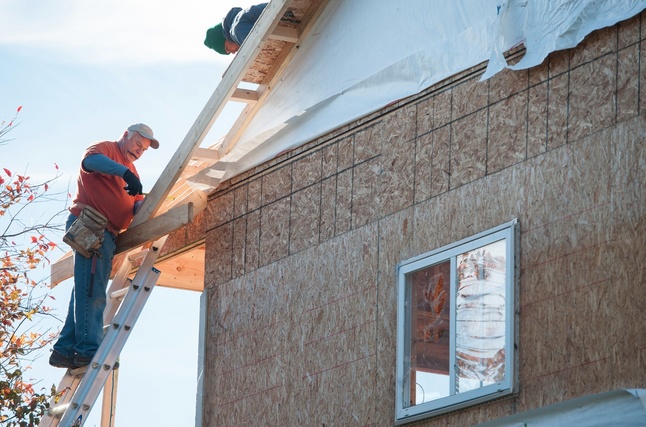
Construction continues in Huron Farms subdivision, where residents are still rebuilding after the tornado that struck in March.
Courtney Sacco | AnnArbor.com
(Editor's note: This story is one among several that will be published Monday and Tuesday on the Dexter Tornado, which struck the community on March 15.)
Todd Austin was lying in a ditch on Dexter Ann Arbor Road, wondering if was safe to get up.
On that March 15 evening, hail nearing two inches wide was pouring down and the memory of a swirling mass of debris just feet away from him minutes earlier remained fresh.
His wife and 3-year-old son were huddled in the basement of his home, barely a mile away. He had no idea if they were safe; he had been speeding home when he noticed a rotating funnel that seemed close enough to touch. He left his car on the road and ran for cover.
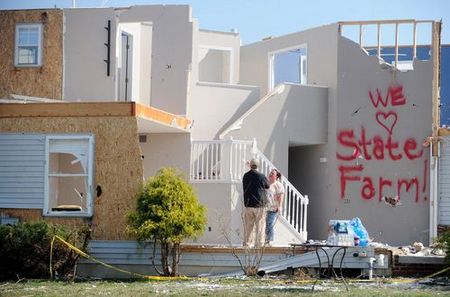
Heather Lutz Leszczynski's home pictured shortly after the tornado that swept through Dexter seven months ago, on March 15.
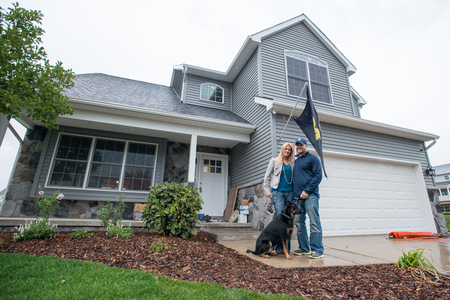
Matt Leszczynski and Heather Lutz Leszczynski are pictured here in front of their Dexter home in early October 2012. Construction on the house is expected to be completed within a month.
Courtney Sacco I AnnArbor.com
Yet when the second warning siren sounded, and his wife's tone transformed from a calm suggestion to urgent pleading, he sent himself, his visiting father and his four pets to the basement.
Minutes later, the six of them listened to the sounds of thrashing, ripping, pandemonium. What was happening up there?
"It was incredibly intense," recalls Austin. The tornado hacked apart his siding and burst his windows, causing tens of thousands of dollars in damage. "It sounded like a freight train. Your ears popped from the drop in pressure."
Heather Lutz Leszczynski, Matt's wife, was speeding home from Ypsilanti, passing homes on Dexter-Pinckney Road with minor roof and tree damage and praying an uprooted tree didn't damage her own home.
She pulled into her neighborhood minutes after the tornado pulled out of it. So did Austin, having decided it was safe to exit the ditch and drive home to check on his family and survey the damage. It was still hailing, their cars weaved through debris on the road as they drove along the once perfectly manicured suburban streets.
"There were trees and debris everywhere. It was gloomy and scary and it was hailing," said Lutz Leszczynski.
As she reached her house, she realized her wishes had been futile. Windows, siding and entire walls were missing, but the unmistakable punch to the gut was realizing she had no second floor to speak of.
"It was so dramatic. It was ripped in half," Lutz Leszczynski said of her home. "I couldn't believe it. Your life will never prepare you to see that."
It might be a cliche, but in the case of the Dexter tornado —an EF-3 strength twister with 145 mile winds that left 7.2 miles of destruction in its wake— pictures really do speak a thousand words.
Houses lost entire second floors, only a clothing rack or toilet mysteriously escaping the unpredictable winds. Uprooted trees sat in living rooms, large pieces of vinyl siding lay flat in the street, strewn beside slats that used to be walls and shoes and photo albums that, minutes before, were tucked safely away in closets and shelves.
What photographs failed to convey, victims say, was the tornado didn't just obliterate homes, it also damaged the sense of security many cherished prior to March 15.
"There were a lot of people in the streets, just kind of wondering around in a daze like you'd see on TV," said Dexter resident Renee Hilgendorf, whose home sustained $40,000 worth of damage from the winds. "It was horrifying to see."
Aftereffects
The Huron Farms neighborhood in Dexter is the classic archetype of American suburbia. Neutral colored homes sit close together —the typical lot size no more than .3 acres— and tidy green lawns with trimmed bushes line cul-de-sacs and sidewalk-rimmed streets.
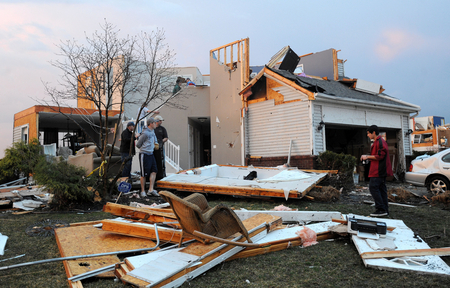
A home damaged by a tornado that swept through Dexter in March
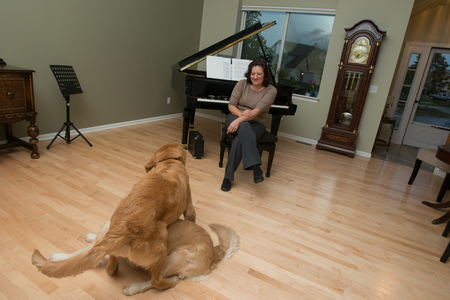
The pain and the sadness, it still creeps up every once in awhile," says Katherine Pfeiffer, pictured here as she watches her dog Bexley and play in her new living room in Dexter. Pfeiffer's home sustained heavy damage from a tornado in March and she was displaced for six months.
Courtney Sacco I AnnArbor.com
On a recent autumn afternoon, children ran circles in one yard, playing as a woman watched from her stoop. A man absently walked from his mailbox, casually sifting through his mail. Another resident nearby used his lawnmower to make neat lines in his front yard.
If it weren't for the smattering of houses that still have blue tarps covering holes, for the few razed houses that were never rebuilt and for the pockets of houses near Noble Street still hammered on daily by construction workers, it could be most any Michigan neighborhood.
As the outward signs of the tornado fade, it would be easy to forget that seven months ago a twister ripped through the 400-home neighborhood, damaging an estimated 100 homes.
Yet for many victims of the tornado, the aftereffects remain part of their daily lives.
On a late September day Austin, for example, was outside with his family when his toddler son caught his attention and showed his father his latest discovery: a quarter-sized "nasty shard of glass" that was leftover from a burst window and pulled out of a flower bed during playtime.
Residents have poured over their lawns —some have even had their yards vacuumed— in search for glass and debris, but months later people continue to find shards. Lawn replacements cost up to $15,000, and in many cases insurance doesn't cover the procedure. At least 28 homeowners have contacted the temporary Dexter Relief Fund for assistance on lawn replacements.
Children no longer go barefoot in their front yards. "We don’t want to worry about this for the next 20 years: Who's going to get a cut foot coming into our yard?" said Austin.
The effects, of course, go much deeper than the inconvenience of insisting children pull on shoes before they play outside. For some victims, overcoming the unseen, emotional burdens left behind by the whirlwind has been difficult.
"It’s still shocking to this day. To this day it still hurts almost like it did then. I don’t know how that will ever not feel like that," said Lutz Leszczynski, whose house was considered a loss by her State Farm insurance. After months of rebuilding, she and her husband will move back into their Huron Farms home next month.
"You know rationally speaking it's super random, but it still feels personal and painful. Obviously a tornado can’t target me, but it feels targeted when it's just you out of just a select few."
Driving back to her rental home in Dexter after a long day at her job as a fundraiser for the University of Michigan, it's not uncommon for Lutz Leszczynski to begin crying as she thinks of what she lost in the tornado and all she has left to do to prepare for her new home.
"You spend all this time building this safe place, this cozy home that has all of your stuff that you love so much, and it’s gone— instantly," said Lutz Leszczynski. "Yes, you will replace things. Everyone says it’s just stuff, but its stuff that you loved and you picked out on purpose because it was a representation of you.
"And there’s nothing you can do. You can’t get it back."
Nancy Paul, director of Faith in Action, which administers relief funds, says stories like Lutz Leszczynski's are not uncommon.
"On the surface things look quite a bit better for families, but there are still a good amount of residual issues," she said.
When the tornado struck on March 15 Katherine Pfeiffer, her teenage daughter and two large dogs huddled inside a 3 foot by 4 foot basement closet as the twister —with winds so strong it sounded like the high-pitched whiz of a tea kettle— ravaged the house she had built from scratch 15 years prior.
When they exited the closet after five minutes of the storm "going on and on and on," glass was everywhere, most of their belongings had broken or been sucked out of their home and hail was dropping from the sky on the grand piano in her living room— much of their second floor had blown away.
"There was so much debris, I cant even describe it," said Pfeiffer. "All of a sudden my house was turned to shreds.
"You don’t know what to do when it’s that bad."
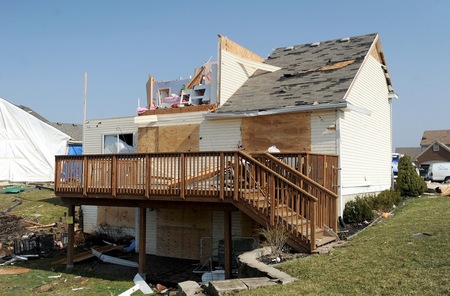
The roof is missing in the photo of Wendy Martin's home taken the day after the March 15 tornado that hit the Huron Farms neighborhood in Dexter.
Angela Cesere | AnnArbor.com
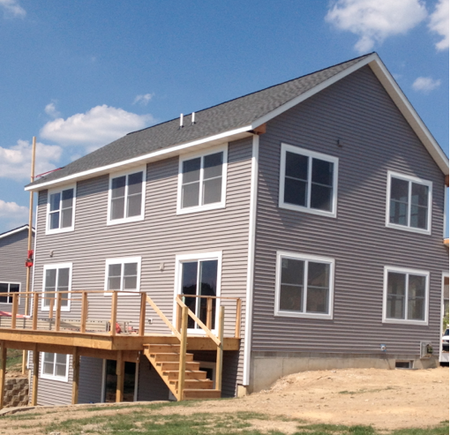
Wendy Martin's house, pictured from behind, after months of construction.
Photo courtesy of Wendy Martin
In the days that followed the tornado, Pfeiffer, Lutz Leszczynski and other residents who suffered losses sorted through their belongings, sifting the salvageable from the ruined. They searched for family keepsakes and photo albums among debris blown haphazardly throughout the neighborhood. They lined up rentals or temporary housing as contractors and insurance companies put a price on their loss and and a timeline on their recovery.
They were kept awake by helicopters that circled overhead, grabbing aereal shots of the damage for morning newscasts. They watched anxiously as insurance adjusters and out-of-town contractors tried to take advantage of their loss. Their lives were on display as hordes of onlookers parked at nearby businesses and walked over to their neighborhood to witness the damage for themselves.
"Your life feels like it's over, and it became a tourist attraction," recalled Lutz Leszczynski. "Your house is ripped up into pieces, your life is exposed in the driveway, you are at your worst, and people walk by and they're taking pictures on their cell phone."
As the days piled up and weeks led to months, victims negotiated with insurance companies, learning what losses would be covered and at how much.
"It's been kind of a stumbling process of learning how insurance works," explained Austin, who is the homeowners association president of a community within Huron Farms. "Some people love their insurance company, some people don’t."
Dave Quinn said at least eight of his Huron Farms neighbors had difficulty with their insurance carriers, with some denying limited coverage. Quinn, for example, was told by his insurance company AAA that just half of his roof replacement would be covered by insurance. Damage to the other half, he was told, couldn't be fully attributed to the tornado. That assessment was contrary to one he received from a county building inspector, he said.
"They think I’m trying to scam them is how they’re treating me," he lamented.
For many hit hard by the tornado, dealing with the aftereffects —whether it be recalling their ruined belongings for insurance claims or working with the contractors rebuilding their homes— became equivalent to a full time job.
"The next morning and the next week and the next month were so hard to get through, it’s kind of just like a day-by-day thing: Can can I make it through the next minute? Can I make it through the next five minutes? Can I make it through the next hour?" recalled Pfeiffer, who was displaced for six months but offered free housing in an unoccupied unit at the Cedars of Dexter, a seniors-only condominium complex.
Added Wendy Martin, a Huron Farms resident whose home was destroyed by the tornado: "Sometimes you get pissed off at your situation."
Miracle
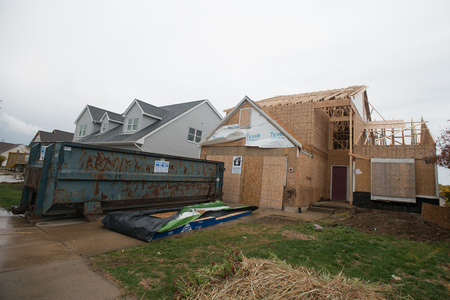
Homes destroyed by the tornado in March near the end of construction along Noble St. in Dexter.
Courtney Sacco I AnnArbor.com
Some say that if you look real hard you can find a miracle in most tragedies. You'd be hard pressed to find someone who doesn't classify the Dexter tornado as a tragedy.
According to Dexter Village, 380 homes were affected by the cyclone. The county tallies 36 of them as sustaining catastrophic or very major damage. In downtown Dexter 35 large trees were uprooted entirely. The twister effortlessly extirpated hundreds of mature trees, many three feet thick, along Dexter-Pinckney Road and rural parts of the county.
The damage is modestly estimated at $9.1 million dollars, although Washtenaw County emergency manager Marc Breckenridge says that if officials could see insurance reports, they'd likely calculate a much higher toll. Meanwhile about $1.1 million was shouldered by government entities through cleanup costs.
"It was the most frightening day," said Breckenridge. "I was more frightened for the people we had to respond to —not knowing what was happening while the tornado was in their neighborhoods— than I was during September 11, 2001."
The miracle?
In spite of the twister traveling along Dexter-Pinckney Road, a well-trafficked corridor commonly used for errands and commutes to work, not one driver was killed. And despite the cyclone twisting through neighborhoods with more than 400 homes and completely destroying at least 13 residences, not one person was even significantly injured.
In sum, while the physical damage of the tornado was admittedly large for this normally calm corner of the Midwest, the mortal toll was nil: Nobody was killed.
"Everybody was OK, nobody was hurt, everything can be fixed," Breckenridge recalled thinking.
That changed the profile of this emergency quite a bit. There was a sense of relief."
In the wake of tornado, volunteers and offers of help began pouring in. More than 6,000 people donated to the Dexter Relief Fund, which now stands at $333,000, with $274,000 already awarded through 246 checks given to affected families.
Awards varied between $75 and $2,500 per household, depending on income and how hard a family was hit by the twister. The average gift was somewhere between $500 and $1,000.
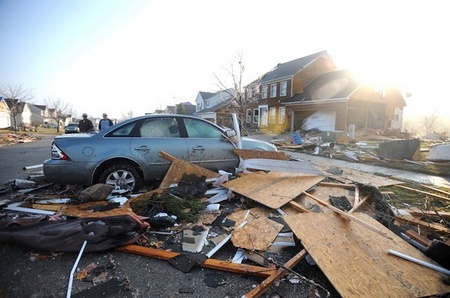
Huron Farms was greatly damaged by the powerful March 15 tornado.
"People living on several hundreds of dollars a month from people making hundreds of thousands of dollars in income each year were affected," explained Paul.
Whatever a victim's income, help was handed out freely in the days following the tornado. A group of men set up a grill in Huron Farms and barbecued for residents there. Thousands in free gift cards and meals were distributed.
"There was food just everywhere. The kids were all out, they were riding scooters through the neighborhood, sneaking Cokes" recalled Paul. "The dads had all the kids out there raking the common areas."
Trucks drove through affected streets and freely handed out water. Residents from nearby brought their families and helped clear yards and gutters.
"We had a hell of a support network," said Martin.
Over time, affected residents began to share stories and offer help. There's now an active Facebook group with dozens of members and multiple posts each week. Through the common experience of the tornado, neighbors that were once strangers became allies.
"We all had to share pain together," said Pfeiffer, whose neighbors have helped her with everything from providing meals to building Ikea shelves in her newly reconstructed home. "We all endured this really terrible experience, this shock. We came through it and in order to get through it, we formed this tight relationship, this bond."
Kellie Woodhouse covers higher education for AnnArbor.com. Reach her at kelliewoodhouse@annarbor.com or 734-623-4602 and follow her on twitter.


Comments
BDF
Tue, Oct 16, 2012 : 3:58 p.m.
I am a Dexter tornado victim and I want to say thank you! Thank you! Thank you! FINALLY someone has reported on the real emotions people have experienced with this tornado instead of just all the stats! Yes, no one was physically hurt at the time of the tornado (praise God) but many people have suffered so much because of it and people not affected just want us to "get over it" and "move on." And while we are certainly trying every single day, it's a process like any other loss we experience in our lives. Great article though I do agree that there needs to be more coverage for Carriage Hills and Dexter-Pinckney Road folks that were hit. People in these areas also suffered damaged homes, and many of us lost a lot of mature trees that can NEVER be replaced in our lifetime. In addition, much of the wildlife we enjoyed so much have had to find new homes themselves. Life is not the same and never will be. The tornado has not gone away and for many, it never will. It's a very difficult journey to be on and it's great to read an article that finally addresses some of these issues! Thank you, again!
phyllisris
Tue, Oct 16, 2012 : 1:31 a.m.
I think perhaps Lutz Leszczynski was driving home on Dexter-ANN ARBOR Rd. from Ypsi, not on Dexter-Pinckney Rd.....Dexter-Pinckney by that time was so clogged shut with fallen trees that she wouldn't have been driving through on her way to Huron Farms. Also....these articles are nice, but once again, the folks on Dexter-Pinckney Rd. and in Carriage Hills are being ignored....we all suffered lots of damage, too... just sayin'.
Tom Todd
Mon, Oct 15, 2012 : 10:14 p.m.
Glad no one got seriously injured, expected more help from snyder
Rork Kuick
Mon, Oct 15, 2012 : 3:53 p.m.
Both I and my wife had extra 40 hour/week "jobs" for several months. You work, eat, sleep, work. I learned that cutting and moving the second 100,000 pounds of wood goes easier than the first, since you'll be in better shape, if you avoid hernia.
lynel
Mon, Oct 15, 2012 : 3:20 p.m.
Look forward to the upcoming articles. I hope they will include a discussion about insurance companies. We pay our homeowners insurance every year, but really have no idea how good it is until we have a disaster. I would be interested to get the opinions of these homeowners.
Barbara Read
Mon, Oct 15, 2012 : 12:46 p.m.
I would like to say, "Thank you," to Busch's grocery store. Many of the food and beverage carts that came around were driven by Busch's employees. Gatorade, apples, etc. Even in all the mess of clean up, it just made you smile to see them coming around. That's just one business. There were so many others. Feel free to add to the list!
Fordie
Mon, Oct 15, 2012 : 4:57 p.m.
They looked remarkably funny walking down the streets with their shopping carts, clad in shirt and tie. That store came through and made a lot of friends that day.
TruthMan
Mon, Oct 15, 2012 : 12:29 p.m.
I think it would be most informative to discover which insurance companies performed the best for the people of Dexter. You could ask each homeowner what company held their insurance and how they would rate the company. just a thought ...
Jim Osborn
Mon, Oct 15, 2012 : 11:48 a.m.
I enjoyed the article, especially the part about the glass in the yards, as I never would have thoug about that. But the writing needs to improve. Here are some examples: "..said Lutz Leszczynski…" Why not say "said Heather Leszczynski" The former implies that her first name is "Lutz" when it is actually her maiden name, or middle name. Earlier the author had said, "…in the basement of his home," as if his wife didn't own it too. Why not say "in the basement of their home,"? The before and after pictures are excellent. The picture of the Leszczynski home after the damage looks similar to a friend's southern California home by a marina. I see damage, but only by seeing the finished view can I really see how bad it really is
Jim Osborn
Mon, Oct 15, 2012 : 12:13 p.m.
"thoug" should be "thought"